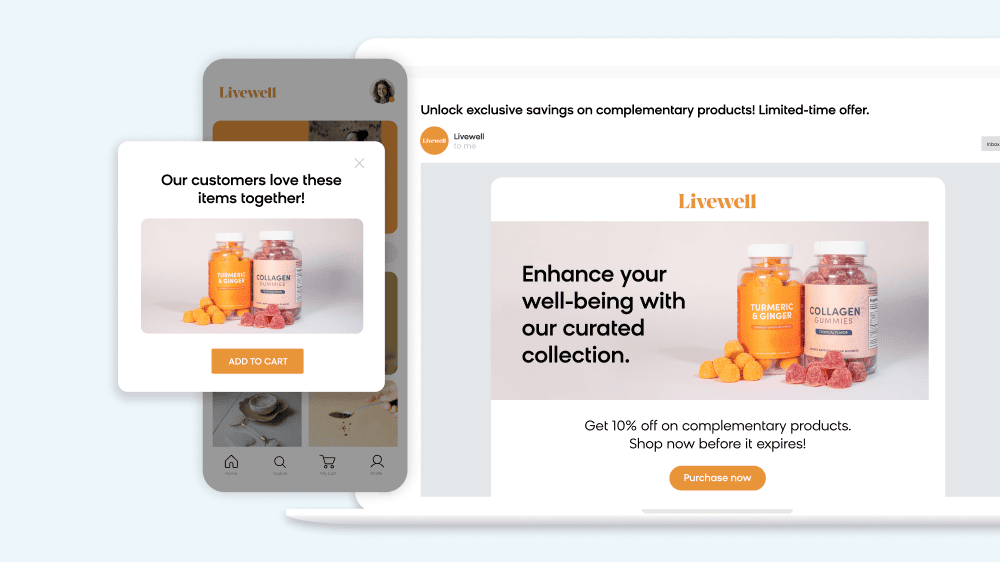Your customer relationship management (CRM) has outgrown its original purpose. What started as simple contact storage has evolved into sophisticated, real-time engagement platforms that power revenue growth across every customer touchpoint.
Traditional CRM approaches (i.e., collecting emails and sending batch campaigns) no longer match the dynamic, omnichannel reality of modern commerce. With over 91% of companies with 10+ employees now using CRM systems and 45% prioritizing a complete view of customer interactions, today’s successful ecommerce businesses need systems that blend customer behavioral data with real-time product intelligence to deliver personalized experiences at scale.
Modern CRM ecommerce platforms like Bloomreach Engagement represent this transformation through intelligent orchestration that connects customer signals with product data across every touchpoint. The result? A platform that doesn’t just store customer information but actively drives revenue through predictive, context-aware automation.
Read on to learn more about the shift in ecommerce CRM technology and how you can take advantage of the latest innovations to boost your brand’s metrics.
The Limitations of Traditional CRMs in Ecommerce Environments
Traditional CRM systems were designed around linear sales processes and static contact management, making them fundamentally incompatible with the dynamic, product-centric nature of ecommerce customer relationships.
The core limitation lies in architecture: traditional systems treat customer interactions as discrete events rather than continuous behavioral streams. This misses critical signals like browsing intensity, product research patterns, and cross-device shopping behavior that indicate purchase intent and timing.
Manual workflow dependence creates another barrier. Traditional CRMs require extensive configuration for each campaign variation, making it difficult to respond quickly to market changes, seasonal trends, or competitive pressures. This inflexibility directly impacts revenue potential in fast-moving ecommerce environments.
Integration complexity compounds these challenges. Legacy CRMs typically require extensive custom development to connect with ecommerce platforms, inventory management systems, and customer service tools. These integrations often break during platform updates, creating data gaps that compromise how effectively a brand can personalize.
Moving Beyond Outdated CRM Models for Modern Ecommerce
Modern CRM ecommerce functions as a lifecycle personalization engine, combining customer behavioral data with product catalog intelligence. This enables real-time personalization that adapts based on browsing patterns, purchase history, and product availability.

Critical gaps in traditional approaches include limited automation beyond basic email marketing, a narrow channel focus that misses cross-channel revenue opportunities, and static segmentation.
Advanced platforms address these limitations through autonomous capabilities. Bloomreach’s Loomi AI powers next-generation CRM technology, continuously adapting customer experiences based on real-time behavioral and product signals rather than predetermined rules.
Core Capabilities That Define Next-Gen CRM Ecommerce
A world-class ecommerce CRM doesn’t just segment contacts — it powers tailored, responsive journeys tied to products, timing, and individual customer behavior patterns. Let’s examine the essential capabilities that separate modern platforms from traditional approaches.
Unified, Real-Time Customer and Product Data
Advanced systems create comprehensive customer profiles by combining behavioral data from multiple touchpoints: website interactions, transaction history, mobile app usage, customer service contacts, and offline store visits.
The key differentiator is real-time product catalog integration. Rather than treating products as static data points, sophisticated CRM ecommerce systems actively incorporate inventory levels, pricing changes, and product performance metrics into customer journey decisions.
Bensons for Beds demonstrates the effectiveness of unifying retail and ecommerce customer journeys. By connecting in-store browsing behavior with online purchase patterns, the brand achieved 41% year-over-year sales growth through more targeted, contextually relevant customer communications.
AI Personalization That Evolves With Customer Behavior
Modern CRM ecommerce systems use artificial intelligence to continuously adapt customer experiences across all touchpoints (email, website, mobile app, SMS, retargeting campaigns, and more) based on detected purchase intent and behavioral patterns. This represents a significant shift, with 65% of CRMs now incorporating AI-driven personalization capabilities.
Unlike traditional segmentation that places customers in static categories, AI-powered systems adjust journey paths in real time. These systems learn from micro-behaviors: time spent viewing specific product categories, cross-device browsing patterns, etc.

ThirdLove exemplifies this through dynamic personalization that adjusts website banners, email content, and product recommendations based on individual sizing preferences and browsing behavior. The brand also implemented a Fit Finder quiz to round out each customer’s data and inform more personalized experiences.
As a result, ThirdLove was able to create dynamic customer archetypes to deliver personalized campaigns to over 3.5 million customers, driving over $256K in incremental revenue within a few months.
Commerce-Centric Data Architecture
Traditional CRM systems treat products as simple attributes attached to customer records. Advanced CRM ecommerce platforms activate product catalog data as primary personalization drivers, incorporating SKU-level information, inventory status, and merchandising logic directly into campaign decisions.
This commerce-centric approach enables sophisticated scenarios, like automatic campaign adjustments based on inventory levels or personalized product recommendations that take profit margins into consideration.
Revolution Beauty utilized AI-driven analytics to find actionable insights. The brand then used this data to tailor communications based on specific product interests, seasonal trends, and individual beauty preferences. This approach helped Revolution Beauty improve loyalty redemptions by 20% and conversion rates by 22%.
Autonomous Campaign Creation
Advanced CRM ecommerce systems enable marketers to define business objectives rather than rigid campaign workflows. The platform then automatically adjusts campaign logic based on customer stage, behavioral signals, and product catalog context, which helps ease the manual workflow dependencies that create barriers in traditional systems.
This autonomous approach handles complex scenarios that would require extensive manual configuration (e.g., reorder reminders tied to product consumption patterns, upselling sequences based on previous purchase behavior, and inventory-aware promotional campaigns that adjust based on stock levels).

Sideshow was bogged down by manual processes, but after using the autonomous marketing solution Bloomreach Affinity, the brand was able to go from campaign idea to launch in just 15 minutes. Thanks to the increase in efficiency, Sideshow can now attribute 13.9% of email revenue directly to Affinity and has even driven $10K in revenue from a single Affinity-powered campaign.
Why Bloomreach Is the Complete Commerce Experience Platform
Bloomreach doesn’t just solve CRM challenges — it redefines CRM as the central engine of an AI-first digital commerce experience that spans the entire customer journey from discovery to advocacy.
Three integrated products work together to address every aspect of ecommerce customer relationships:
- Engagement and Affinity provide AI-led, omnichannel orchestration that adapts customer experiences in real time based on behavioral signals and business objectives
- Discovery delivers personalized product search and dynamic merchandising that connects customer intent with relevant product recommendations
- Clarity offers conversational shopping experiences that learn from each customer’s context and preferences to make online shopping more seamless
This integrated approach eliminates data silos and integration challenges that plague traditional CRM implementations. Rather than connecting disparate tools through complex middleware, businesses get a unified platform designed specifically for commerce use cases.

Strategic Questions for Choosing a CRM Ecommerce Solution
Selecting the right CRM ecommerce solution requires evaluating capabilities that directly impact revenue growth and operational efficiency rather than focusing solely on feature lists or traditional CRM metrics. Here are some considerations to keep in mind when looking for a solution.
Key Evaluation Areas
Real-time data integration capabilities: Can the solution trigger campaigns using real-time catalog data combined with behavioral signals? Advanced platforms should automatically adjust messaging based on inventory levels, product performance metrics, and more.
AI-powered journey optimization: Does the platform use artificial intelligence to adjust customer journeys dynamically, or does it simply provide better reporting on static segments? True AI implementation should continuously optimize for business outcomes rather than engagement metrics
Product-centric architecture: Does the solution treat product catalog information and inventory data as dynamic campaign inputs, or are products handled as static customer attributes? Commerce-focused CRM systems should enable sophisticated product-based triggers and personalization.
Marketing team independence: Can marketing teams build and modify campaigns without requiring engineering support for each change? Modern ecommerce moves quickly, and CRM systems must enable rapid campaign iteration and optimization.
Ecommerce platform integration: Does the CRM integrate natively with your ecommerce technology stack (Shopify, SAP Commerce, Magento, or Salesforce Commerce Cloud)? Native integrations ensure data consistency and enable real-time personalization while avoiding any potential implementation headaches.
Cross-channel personalization scope: Is personalization limited to email campaigns, or does it extend across website experiences, mobile apps, and advertising platforms? Comprehensive personalization requires consistent data and messaging across all customer touchpoints.
Building the Future of Revenue-Driven Customer Relationships
The evolution of CRM ecommerce represents a fundamental shift from reactive customer management to predictive experience orchestration. Modern systems don’t just respond to customer actions — they proactively engineer high-converting journeys based on behavioral patterns, product performance data, and business objectives.
Advanced CRM ecommerce platforms function as revenue engines rather than simple relationship managers. They connect customer behavioral signals with product catalog intelligence to create experiences that drive specific business outcomes: increased average order values, improved customer retention rates, and higher lifetime value.
To create truly effective CRM strategies, you need a solution like Bloomreach — an all-in-one platform that personalizes the entire customer journey. Powered by next-generation AI, Bloomreach gives you the tools you need to deliver the most relevant experiences possible — at scale.
You need to transform your customer relationship management if you want to keep up with modern expectations. Learn more about how you can personalize more effectively with Bloomreach.













